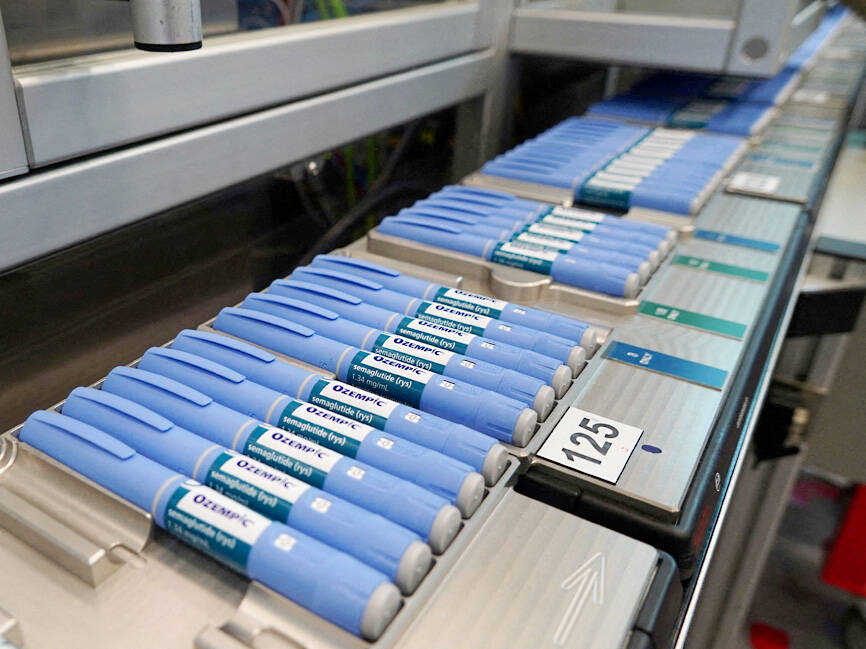Anyone caught bringing fake Ozempic injection pens into Taiwan could face a prison sentence of up to 10 years with a possible fine of up to NT$100 million (US$3.21 million), the Food and Drug Administration (FDA) said on Sunday after its US counterpart disclosed last week that it had seized thousands of the counterfeit diabetes injection pens.
On Thursday last week, the US Food and Drug Administration said the fake Ozempic pens it had seized were being tested by drugmaker Novo Nordisk and the national medicine regulator, but more might be circulating on the market.
The US’ seizure of the fake drug pens followed reports last month in the EU and the UK of counterfeit units of the drug being found.

Photo: Reuters
An Ozempic pen is a device that is prefilled with the drug semaglutide, which can be used for easy self-injection to help with weight loss in specific patients, to lower blood sugar levels and reduce the risk of major cardiovascular events such as heart attack or stroke in patients with type 2 diabetes.
The FDA said it had stepped up inspections of imported packages, in collaboration with customs officers, and was monitoring illegal drug sales and online purchasing activities.
Anyone found manufacturing or importing counterfeit or prohibited drugs into Taiwan would be subject to a prison sentence of up to 10 years and a potential maximum fine of NT$100 million, it said, citing Article 82 of the Pharmaceutical Affairs Act (藥事法).
The maximum penalty for knowingly selling counterfeit or prohibited drugs, or displaying them with an intent to sell, is seven years in prison and a possible fine of NT$50 million, it said.
It urged the public not to purchase online products from unknown sources, items with unclear labels, or products with exaggerated or misleading claims related to medical efficacy.
The agency said it had granted a license for the importation of Ozempic, and the label of the product should show the name in Chinese and the drug license number. The counterfeit drugs seized in the US would not have that type of labeling and would not be products approved in Taiwan, it said.
People in Taiwan should avoid buying those types of drugs online, from foreign countries or from other distributors, as their safety and efficacy cannot be confirmed under those circumstances, it said.
The agency has approved the use of four types of injection pens: Ozempic, Trulicity, Saxenda and Victoza — all prescription drugs.

TRAFFIC SAFETY RULES: A positive result in a drug test would result in a two-year license suspension for the driver and vehicle, and a fine of up to NT$180,000 The Ministry of Transportation and Communications is to authorize police to conduct roadside saliva tests by the end of the year to deter people from driving while under the influence of narcotics, it said yesterday. The ministry last month unveiled a draft of amended regulations governing traffic safety rules and penalties, which included provisions empowering police to conduct mandatory saliva tests on drivers. While currently rules authorize police to use oral fluid testing kits for signs of drug use, they do not establish penalties for noncompliance or operating procedures for officers to follow, the ministry said. The proposed changes to the regulations require

Taipei, New Taipei City, Keelung and Taoyuan would issue a decision at 8pm on whether to cancel work and school tomorrow due to forecasted heavy rain, Keelung Mayor Hsieh Kuo-liang (謝國樑) said today. Hsieh told reporters that absent some pressing reason, the four northern cities would announce the decision jointly at 8pm. Keelung is expected to receive between 300mm and 490mm of rain in the period from 2pm today through 2pm tomorrow, Central Weather Administration data showed. Keelung City Government regulations stipulate that school and work can be canceled if rain totals in mountainous or low-elevation areas are forecast to exceed 350mm in

1.4nm WAFERS: While TSMC is gearing up to expand its overseas production, it would also continue to invest in Taiwan, company chairman and CEO C.C. Wei said Taiwan Semiconductor Manufacturing Co (TSMC) has applied for permission to construct a new plant in the Central Taiwan Science Park (中部科學園區), which it would use for the production of new high-speed wafers, the National Science and Technology Council said yesterday. The council, which supervises three major science parks in Taiwan, confirmed that the Central Taiwan Science Park Bureau had received an application on Friday from TSMC, the world’s largest contract chipmaker, to commence work on the new A14 fab. A14 technology, a 1.4 nanometer (nm) process, is designed to drive artificial intelligence transformation by enabling faster computing and greater power

China Airlines Ltd (CAL) yesterday morning joined SkyTeam’s Aviation Challenge for the fourth time, operating a demonstration flight for “net zero carbon emissions” from Taiwan Taoyuan International Airport to Bangkok. The flight used sustainable aviation fuel (SAF) at a ratio of up to 40 percent, the highest proportion CAL has achieved to date, the nation’s largest carrier said. Since April, SAF has become available to Taiwanese international carriers at Taipei International Airport (Songshan airport), Kaohsiung International Airport and Taoyuan airport. In previous challenges, CAL operated “net zero carbon emission flights” to Singapore and Japan. At a ceremony at Taoyuan airport, China Airlines chief sustainability